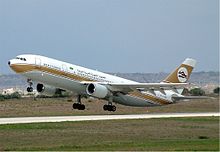Tripoli: March 26
Acting on deep safety concerns from the EU, the Libyan Transport Ministry has banned all Libyan carriers from flying . . .[restrict]into Europe with immediate effect.
A European Commission transport spokesman said today: “The Libyan authorities have taken this initiative and voluntarily implemented a ban on all Libyan carriers flying into Europe with immediate effect.
“This is in order to give the Libyan authorities time to address serious underlying safety problems with regard to the the oversight of air carriers in Libya.
“The Commission fully supports this approach and has agreed to work closely with the Libyan authorities to resolve the current problems”.
Local sources indicate that what has been worrying the EU is that the certification for flight deck crew, ground engineers and maintenance staff are no longer in date. Had Libya not agreed to impose the ban itself, the European authorities would have acted unilaterally.
Libyan airlines fly to Manchester and London Heathrow as well as eight other European cities.
On March 15, Interior Minister Fawzi Abdelal extended a Paris trip to visit the EU Commission in Brussels. He is believed to have tried to sort out the issue and persuade the Commission not to insist on the ban.
Though ban was supposed to take effect from midnight yesterday, only one Libyan Airlines flight to Europe, the 0830 to Manchester was cancelled. Flights to Athens, Madrid and Malta all left Tripoli today. The airport also reported that Libyan Airline planes left for Tunis, Cairo, Algiers, Amman, Istanbul, Ankara and Alexandria.

Airline management could not be contacted today for comment. There was speculation that had the 80 seater Bombardier CRJ900 landed in Manchester, the UK Civil Aviation Authority might not have allowed it to return to Libya. As it was, the return flights from Malta and Madrid both took off for Tripoli without problem.
It was only last September that the EU lifted a ban on Libyan aircraft using European airspace and airports, imposed as part of the sanctions against the Qaddafi regime. Brussels also unfroze assets held in Europe by both Libyan Airlines and Afriqiyah Airways.
In December Air France signed a deal to repair aircraft belonging to both airlines, that were damaged in the fighting during the revolution. The French carrier also reinstated a suspended contract to support Afriqiyah’s Airbus A320 and A330 aircraft
It further signed a deal with Libyan Airlines to repair and maintain its fleet of seven A320s, three of which were still due to be delivered. At the turn of the year, both carriers had outstanding aircraft orders worth $4 billion. [/restrict]








